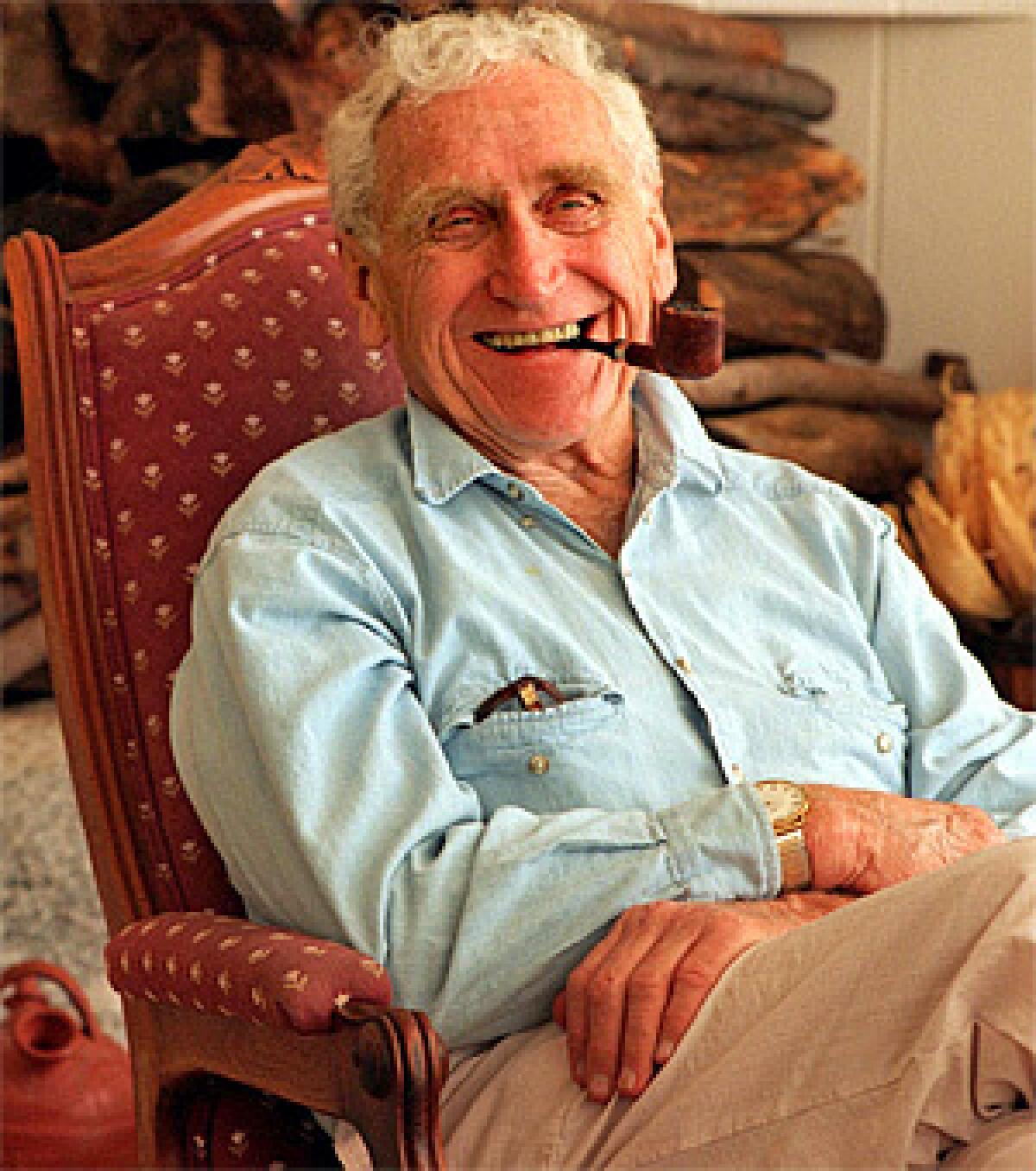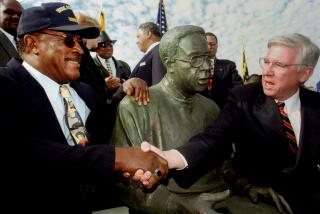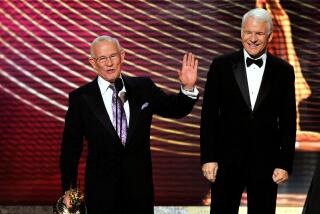James Whitmore dies at 87; veteran award-winning actor brought American icons to life

- Share via
James Whitmore, the veteran Tony- and Emmy-winning actor who brought American icons Will Rogers, Harry Truman and Theodore Roosevelt to life in one-man shows, died Friday. He was 87.
Whitmore died of lung cancer at his home in Malibu, said his son, Steve. He was diagnosed with the disease a week before Thanksgiving.
“He cared about acting; his whole life was dedicated to the theater and to movies,” said actor David Huddleston, a longtime friend who appeared in Whitmore’s 1964 movie “Black Like Me” and did a couple of plays with him. “I asked James Cagney one time to tell me the best thing you can about acting. He said never to get caught at it. That’s kind of how I’d sum up Jim Whitmore.”
James Arness, who appeared with Whitmore in the movies “Battleground” and “Them!,” said Whitmore was “an actor’s actor,” adding that “it was always a treat to work with him.”
Arness also remembered the “great intensity” Whitmore could bring to a role.
“When we wanted to get an actor to play a character who had that quality, Jimmy was the guy you’d think of,” said Arness, who starred in “Gunsmoke,” a TV series that Whitmore appeared on a number of times.
A stocky World War II Marine Corps veteran who bore a resemblance to actor Spencer Tracy and shared Tracy’s down-to-earth quality, Whitmore earned early acclaim as an actor.
In 1948, he won a Tony Award for outstanding performance by a newcomer in the role of an amusingly cynical Army Air Forces sergeant in the Broadway production of “Command Decision.”
Whitmore’s Broadway success brought him to Hollywood, where he received an Academy Award nomination for best supporting actor in his second movie, the hit 1949 World War II drama “Battleground,” in which he played a tobacco-chewing, battle-weary Army sergeant.
Supporting roles and occasional leads in some 50 movies followed over the next 50-plus years, including “The Asphalt Jungle,” “Them!,” “Kiss Me Kate,” “Battle Cry,” “Oklahoma!,” “Planet of the Apes,” “Tora! Tora! Tora!,” “The Serpent’s Egg,” “Nuts,” “The Shawshank Redemption” and “The Majestic.”
A frequent guest actor on television, Whitmore also starred in three series: the 1960-62 legal drama “The Law and Mr. Jones,” the 1969 detective drama “My Friend Tony” and the 1972-74 hospital sitcom “Temperatures Rising” (although he left after a year, he later said, “because it was just a series of jokes”).
In 2000, Whitmore won an Emmy Award as outstanding guest actor in a drama series for “The Practice,” and he received a 2003 Emmy nomination in the same category for “Mister Sterling.”
An avid flower and vegetable gardener, Whitmore also was known to TV viewers as the longtime commercial pitchman for Miracle-Gro garden products.
Whitmore often said he found acting in films and television boring because of the long waits between scenes; his passion was for the theater, and he continued to act on stage throughout his long career.
“I’ve been very, very lucky,” he said in a 2003 interview with the Nashville Tennessean. “The stage is human beings sharing something together -- flesh and blood together -- and the others are mechanical and shadows on the screen.”
Although he starred in productions of plays such as “Our Town,” “Inherit the Wind” and “Death of a Salesman,” Whitmore was best known for his three one-man shows: as Truman in “Give ‘em Hell, Harry!,” as Roosevelt in “Bully” and as Rogers in “Will Rogers’ U.S.A.”
The 1975 film of his performance in “Give ‘em Hell, Harry!” earned Whitmore a best actor Oscar nomination.
But the one-man-show character he said he “always felt most comfortable with” was Rogers.
“He was wise with a sense of humor, and that’s an unbeatable combination,” Whitmore told the Manchester (N.H.) Union Leader in 2003.
He was initially resistant to the idea of playing the gum-chewing, lariat-twirling humorist -- his first one-man show -- when adapter-director Paul Shyre brought “Will Rogers’ U.S.A.” to him in 1969.
“I didn’t think I could conceivably carry an evening by myself. I had difficulty holding the attention of my family,” Whitmore recalled in a 1995 interview with The Times.
But any qualms he had disappeared when the show premiered in a small theater in Webster Groves, Mo., in January 1970.
“I realized immediately that I was in the presence of an extraordinary man,” Whitmore told The Times. “I didn’t realize that until I heard the response of other human beings to him.”
Whitmore ultimately had about eight hours of Rogers’ various comments about the topics of the day memorized, changing the show each time he did it.
“I tried to use whatever seemed to be of interest to the folks in the audience that day,” he told the Tulsa World in 2001. “I took the news from today’s newspaper but didn’t change what Will Rogers said. It’s amazing how little things have changed since Will was about.”
Whitmore completed 30 years of on-and-off touring as Rogers at Ford’s Theatre in Washington in 2000, and his costume is now housed in the Smithsonian Institution.
Born in White Plains, N.Y., on Oct. 1, 1921, Whitmore later moved to Buffalo, N.Y., where he attended public schools until his senior year of high school, when he attended the Choate School in Wallingford, Conn., on a football scholarship.
He was a pre-law major on an athletic scholarship at Yale University, but he had to quit playing football after suffering two knee injuries.
While at Yale, Whitmore helped launch the campus radio station.
“I was able to stay in school with a nightly sports show, ‘Jim Whitmore Speaks,’ with interviews and sports news. I made 40 bucks a week,” he told the Tennessean in 2003.
With World War II underway, Whitmore joined the Marines during his senior year in 1942 and served in the South Pacific. After his discharge, he eventually moved to New York City and used the GI Bill to study acting at the American Theatre Wing.
In 1947, he married his first wife, Nancy Mygatt, with whom he had three children. They were divorced after 24 years. After Whitmore’s second marriage in the 1970s, to actress Audra Lindley, he and his first wife were remarried but divorced after two years.
Whitmore, who was an early student at the Actors Studio in New York in the late ‘40s, taught an acting workshop after moving to Hollywood. Among his students in the early ‘50s was young James Dean, whom Whitmore advised to go to New York.
“I owe a lot to Whitmore,” Dean told Seventeen magazine in 1955. “One thing he said helped more than anything. He told me I didn’t know the difference between acting as a soft job and acting as a difficult art.”
For his part, Whitmore remained modest about his own acting talent.
“I never thought I was good,” he told the Palm Beach Post in 2002. “I’ve touched the hem of the garment a few times but never grabbed it full-hand.”
When he died Friday, Whitmore “was surrounded by what he considered to be the most important thing in his life, which was his family,” his son Steve said.
In addition to his son Steve, Whitmore is survived by his wife, Noreen; sons James Jr. and Dan; eight grandchildren; and five great-grandchildren.
Services are pending.
More to Read
Start your day right
Sign up for Essential California for the L.A. Times biggest news, features and recommendations in your inbox six days a week.
You may occasionally receive promotional content from the Los Angeles Times.








